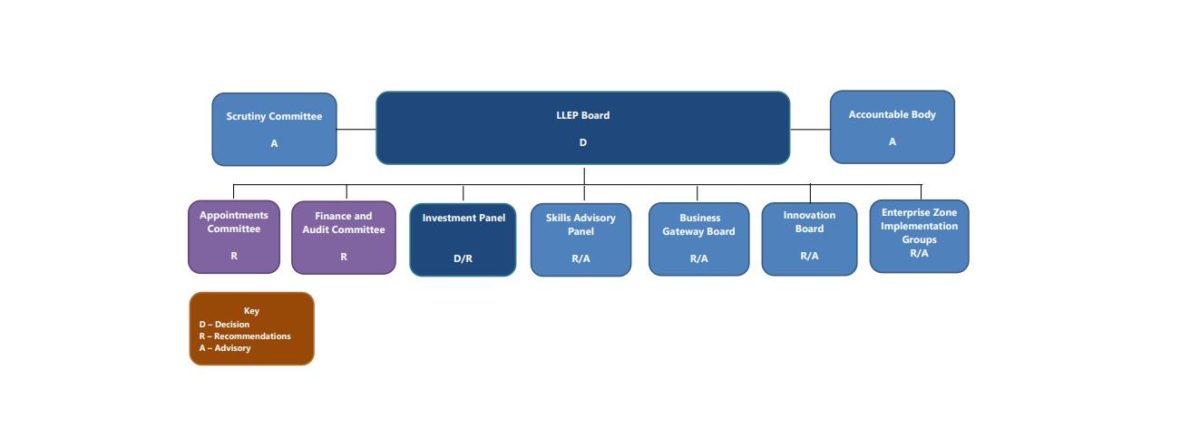On this page, you can find out who sits on our Skills Advisory Panel, and download all relevant board papers.
The Skills Advisory Panel (SAP) supersedes the former People Board. The SAP is responsible for:
- Overseeing the development of the skills aspects of the Local Industrial Strategy (LIS) and leading the strategy and direction for skills development and employment support priorities
- Developing an LLEP area skills action plan
- Providing delivery assurance to the Executive of the delivery of projects and programmes
- Making recommendations to and advising the LLEP Executive and Board about future skills investment opportunities
- Engaging stakeholders in the development and review of the LIS and delivery of programmes
Members of the Skills Advisory Panel
- Verity Hancock, LLEP Board Director and Principal of Leicester College – Chair
- Larraine Boorman, LLEP Board Director
- Sarah Pennelli, Blaby District Council
- Diane Beresford, East Midlands Chamber
- James Smalley, Volutary Action LeicesterShire
- Cllr Danny Myers, Leicester City Council
- Sandra Cowley, Futures
- Gareth Thomas, Institute of Directors
- Simon Lawrence , Leicestershire County Council
- James Bagley, Gateway College
- Dawn Parkinson, Beaumont Leys School
- Eloise Shelton , Vanilla Recruitment
- Allison Tripney, Leicester City Football Club
- Jo Dexter, BEIS
- Dena Read, Education and Skills Funding Agency
- Katherine Borys and Amy Bruce, Department of Work and Pensions/JCP
- Adele Browne, De Montfort University
- Debbie Joce, Cavendish Nuclear Ltd.
In Regular Attendance
- Stewart Smith, LLEP Head of Skills
- Anna Cyhan , LLEP Economic Growth and Investment Officer (Skills)
Meetings are held quarterly. An outline of how local skills and employment groups link into the Skills Advisory Panel (formally known as the People Board) is in the download below.
SAP response to COVID-19
Due to the ongoing COVID-19 pandemic, we are now working on collating business, skills and economic intelligence to inform our Economic Recovery Strategy for Leicester and Leicestershire. We will analyse the economic shock to the area, create short term economic recovery plans, and develop a long-term economic recovery strategy.
Terms of Reference
1. Background
1.1. The Leicester & Leicestershire Local Enterprise Partnership (LLEP) was created in line with the Government’s policy of supporting economic growth through Local Enterprise Partnerships (LEPs). The LLEP is an association made up of local authorities and representatives of business, educational institutions and the voluntary sector.
1.2 The objectives of the LLEP are in accordance with the Government’s Localism Act. In general terms the focus is on local growth and the LLEP will be seeking to do this by:
- Working with Government to set out key investment priorities for Leicester & Leicestershire
- Engaging with business, local authorities, Higher Education, Further Education, VCS and other stakeholders
- Facilitating local partnership working and relations with national Government
- Influencing national Government economic policy and spending
- Investing LLEP funding and aligning partner resources
- Through its investments, influence and activities ensure positive outcomes for the local economy.
2. Governance
2.1 The diagram below sets out the governance of the partnership.

2.2 The governance expectations set out in Strengthened Local Enterprise Partnerships will apply to the Skills Advisory Panel. The Skills Advisory Panel, as part of the wider LLEP, will adhere to the standards of transparency, conflicts of interest, accountability and diversity, as set out in the Local Enterprise Partnership: National Assurance Framework and Strengthened Local Enterprise Partnerships.
3. Skills Advisory Panel Responsibilities
3.1 The Skills Advisory Panel is accountable to the LLEP Board of Directors and is has an advisory role with the following responsibilities:
(i) Providing a strong leadership role on skills in the local area, engaging with employers and providers and providing skills advice to the LLEP Board.
(ii) Developing a clear understanding of current and future local skills needs and local labour market as well as the present skills and employment support provision in the local area. This will be achieved through the production of robust and authoritative evidence-based analysis.
(iii) Overseeing the development and review of the ‘People’ element of the Local Industrial Strategy.
(iv) Building on this high-quality analysis to develop a Skills Strategy for addressing skills and employment challenges within the local area.
(v) Understanding the wider dependencies in the local area and working together with other parts of the LLEP to ensure the ‘People’ element of the Industrial Strategy is integrated effectively.
(vi) Making recommendations to and advising the LLEP Board of Directors about future investment opportunities.
(vii) Acting as a co-ordinator of local skills providers through fostering co-operation between providers in a mix of provision and actively working with a range of local providers at all levels to plan for how the skills needs are to be met. This will include encouraging providers to reflect on the Skills Advisory Panel analysis when planning for future T Level implementation and Delivery.
(viii) Working closely with careers advisory services (National Careers Service and Enterprise Adviser Network) to ensure that potential learners are informed about potential career routes within the area, and that careers information advice and guidance is informed by easily accessible current local labour market information.
(ix) Advising where skills and labour market resource should be directed to support local employers and residents, using the Panel’s understanding of existing employment support provision in the local area and the needs of the local labour market.
(x) Raising the profile of apprenticeships with local employers and providers.
(xi) Providing representation on the Skills Advisory Panel for the skills and education area to which members belong (e.g. schools, higher education, voluntary sector etc) and ensuring that relevant consultation and feedback takes place with those groups via the members represented on the SAP to ensure that the views and input of the wider stakeholder community is taken into account in SAP recommendations.
3.2 Further national guidance on the Role and Governance of Skills Advisory Panels can be found in Skills Advisory Panels – Guidance on the Role and Governance (DfE December 2018)
4. Membership
4.1 The Skills Advisory Panel will be chaired by an appropriate member of the LLEP Board and membership will include a representative from:
- LLEP Board (Chair) and one other private sector Board Member
- Employers and employer representative bodies
- Higher Education
- Further Education
- Private training providers
- Schools
- Futures (NCS contract holder)
- Leicester City Council
- Leicestershire County Council
- District Councils
- Voluntary and Community Sector
- DWP
In attendance: LLEP Executive and Officer
4.2 The Skills Advisory panel may also invite local representatives of the following government departments to attend periodically as required:
- Cities and Local Growth Unit
- Education and Skills Funding Agency
5. Reporting Mechanisms
5.1 The Skills Advisory Panel reports to the LLEP Board of Directors.
6. Working Arrangements
6.1 Meetings of the Skills Advisory Panel will take place quarterly. Any additional meetings will be arranged as required and specialist meeting will be set up separately. Agendas and any papers will be circulated not later than one week before Skills Advisory Panel meetings and minutes and agreed actions will be recorded and circulated to members within two weeks following the meeting. The Skills Advisory Panel will be supported by the LLEP Team.


